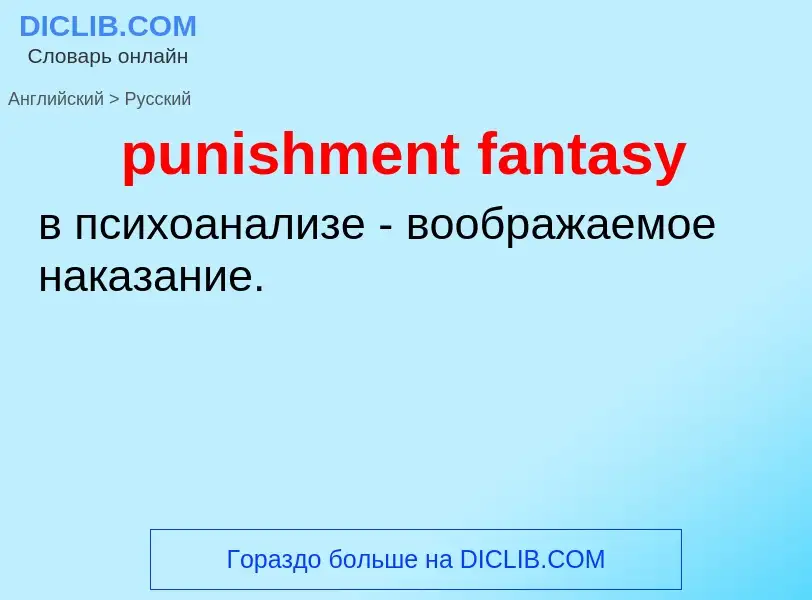Tradução e análise de palavras por inteligência artificial ChatGPT
Nesta página você pode obter uma análise detalhada de uma palavra ou frase, produzida usando a melhor tecnologia de inteligência artificial até o momento:
- como a palavra é usada
- frequência de uso
- é usado com mais frequência na fala oral ou escrita
- opções de tradução de palavras
- exemplos de uso (várias frases com tradução)
- etimologia
punishment fantasy - tradução para russo
['fæntəsi]
общая лексика
фантазия
существительное
['fæntəsi]
общая лексика
воображение
фантазия
плод
игра воображения
каприз
необоснованное предположение
бред
воображение, фантазия
иллюзия
устаревшее выражение
галлюцинация
литература
фантастика
синоним
глагол
музыка
играть фантазии
импровизировать
синоним
Definição
Wikipédia
In operant conditioning, punishment is any change in a human or animal's surroundings which, occurring after a given behavior or response, reduces the likelihood of that behavior occurring again in the future. As with reinforcement, it is the behavior, not the human/animal, that is punished. Whether a change is or is not punishing is determined by its effect on the rate that the behavior occurs. This is called motivating operations (MO), because they alter the effectiveness of a stimulus. MO can be categorized in abolishing operations, decrease the effectiveness of the stimuli and establishing, increase the effectiveness of the stimuli. For example, a painful stimulus which would act as a punisher for most people may actually reinforce some behaviors of masochistic individuals.
There are two types of punishment, positive and negative. Positive punishment involves the introduction of a stimulus to decrease behavior while negative punishment involves the removal of a stimulus to decrease behavior. While similar to reinforcement, punishment's goal is to decrease behaviors while reinforcement's goal is to increase behaviors. Different kinds of stimuli exist as well. There are rewarding stimuli which are considered pleasant and aversive stimuli, which are considered unpleasant. There are also two types of punishers. There are primary punishers which directly affect the individual such as pain and are a natural response and then there are secondary punishers which are things that are learned to be negative like a buzzing sound when getting an answer wrong on a game show.
Conflicting findings have been found on the effectiveness of the use of punishment. Some have found that punishment can be a useful tool in suppressing behavior while some have found it to have a weak effect on suppressing behavior. Punishment can also lead to lasting negative unintended side effects as well. Punishment has been found to be effective in countries that are wealthy, high in trust, cooperation, and democracy.
Punishment has been used in a lot of different applications. Punishment has been used in applied behavioral analysis, specifically in situations to try and punish dangerous behaviors like head banging. Punishment has also been used to psychologically manipulate individuals to gain control over victims. It has also been used in scenarios where an abuser may try punishment in order to traumatically bond their victim with them. Stuttering therapy has also seen the use of punishment with effective results. Certain punishment techniques have been effective in children with disabilities, such as autism and intellectual disabilities.

 (14730388126).jpg?width=200)
![''[[Avon Fantasy Reader]]'' 18 ''[[Avon Fantasy Reader]]'' 18](https://commons.wikimedia.org/wiki/Special:FilePath/Avon Fantasy Reader 18.jpg?width=200)
![Illustration from 1920 edition of [[George MacDonald]]'s novel ''[[The Princess and the Goblin]]'' Illustration from 1920 edition of [[George MacDonald]]'s novel ''[[The Princess and the Goblin]]''](https://commons.wikimedia.org/wiki/Special:FilePath/Curdie went on after her, flashing his torch about..jpg?width=200)
 (14730393436).jpg?width=200)
